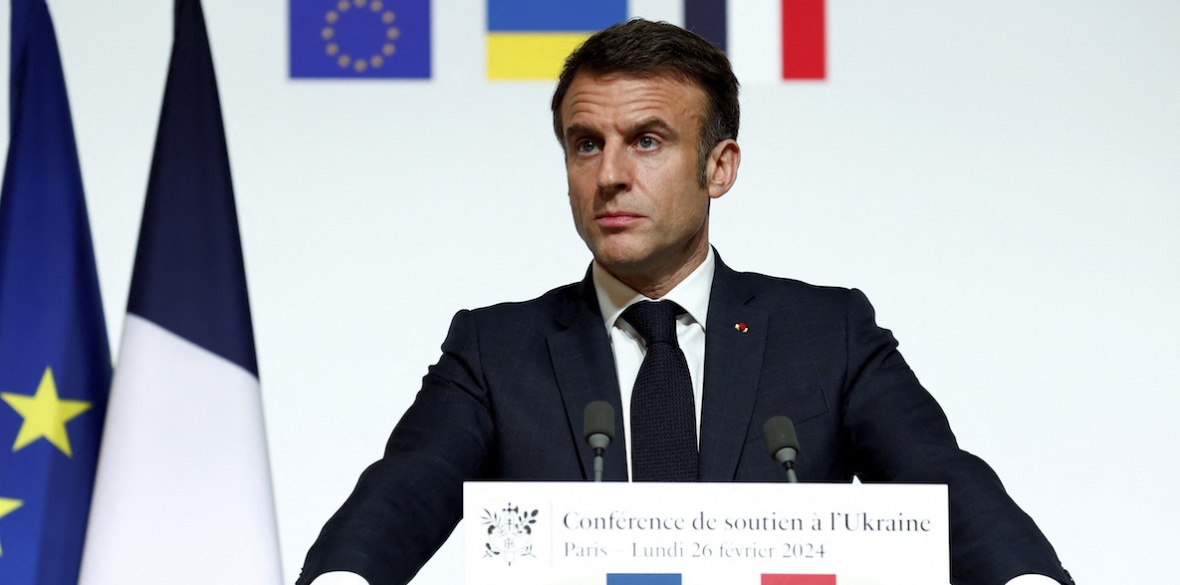This is the last article you can read this month
You can read more article this month
You can read more articles this month
Sorry your limit is up for this month
Reset on:
Please help support the Morning Star by subscribing here
THE world took a step closer to global war this week with President Emmanuel Macron’s public speculation about deploying Nato forces to fight Russia in Ukraine.
The French leader made it clear that there was, unsurprisingly, no consensus or agreement on the matter. But even raising the possibility is deeply dangerous and irresponsible.
Nato has been giving Ukraine full backing throughout the conflict, in terms of armaments, economic aid and diplomatic support. Special forces, including British, have been deployed near combat zones.
However, the direct use of Western armed forces would mean Nato was effectively at war with Russia. The catastrophic potential consequences of fighting the power with the most nuclear warheads in the world scarcely need spelling out.
That Macron has floated this alarming trial balloon reflects two facts — Ukraine is not winning the war; and the divided West is not yet ready to seriously consider peace talks.
On the battlefield, Ukraine’s much-trumpeted counter-offensive last year achieved little. Russia has made limited gains, most recently around Avdiivka, at considerable cost, without obtaining a strategic breakthrough.
In the Black Sea, Ukraine has performed better, denying the Russian fleet the expected control of the waves. Neither side appears to have the air superiority necessary for sustained advances.
Nevertheless, the tide overall has turned in Russia’s favour. The US arms, without which Ukraine could not long fight, have been held up by Republicans in Washington.
Nato sanctions have not had the anticipated impact on Russia’s economy, and most of the world persistently refuses to align with Washington over the conflict.
This should be a moment for a ceasefire followed by peace negotiations. Several things stand in the way, however.
On the Russian side, war aims remain unclear. Former president, and present deputy security council chair, Dmitri Medvedev said at the weekend that Russia would someday need to march on Kiev again.
He asserted that the Zelensky government must be brought down and threw in a claim for Russian control over the port of Odessa for good measure.
It is obvious that having failed to achieve any of these objectives by force, Russia is not going to secure them through negotiation.
Nor is there any mood in Kiev at present to make the necessary concessions to end the fighting.
The larger obstacle, however, is the determination of Washington and its allies to prolong the war as part of a global strategy to maintain the hegemony of Western imperialism.
The US and Britain are habitually in the bellicose lead. They seek to block ceasefires in Ukraine and Gaza alike, and they are champions of confronting China in the Pacific. Anglo-US policy is endless war.
That France is now upping the rhetoric around Ukraine is additional cause for alarm. Rather than bring the agony to an end by seeking to address Russia’s real security concerns, while supporting Ukraine’s sovereignty and the rights of its minorities, it seeks to pursue the chimaera of a Russian defeat.
Such a defeat is not only highly improbable, the pursuit of it is reckless in the highest degree. Perhaps Macron hopes that by rattling the sabre of a direct rather than a proxy war Russia might moderate its conduct or ambitions.
That seems far less likely than a continuing escalation with the Ukrainian people the principal losers.
The Ukraine crisis may not arouse the same intense feelings as Israel’s barbarism in Gaza, but it is in large part the product of the same policies and the same forces driving Nato imperialism.
The labour and anti-war movements must give a clear rebuff to Macron’s warmongering. We will not fight Russia in Ukraine.









